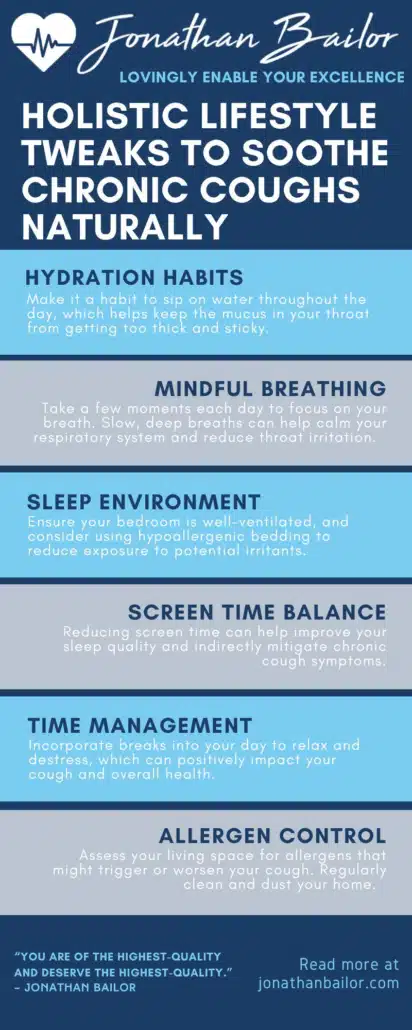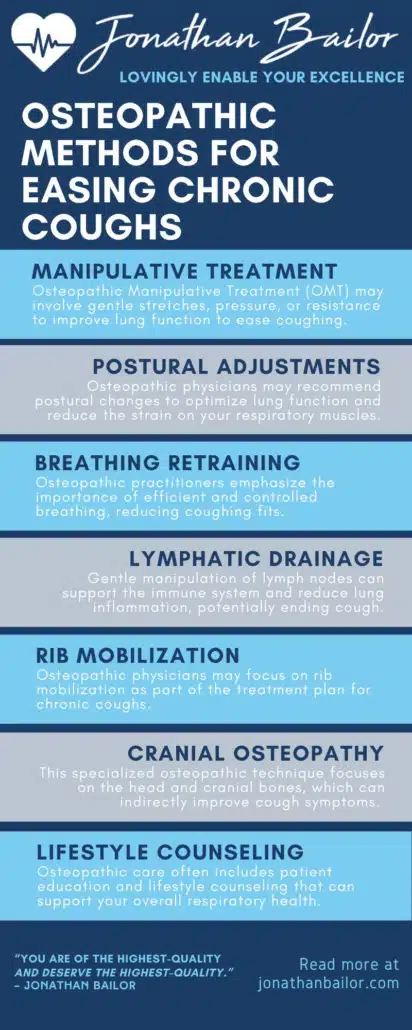31 Evidence-Based Treatments for Managing Chronic Cough Without Medication
Imagine sitting in your cozy living room, sipping on a warm cup of tea, when an annoying and persistent cough suddenly interrupts your peaceful evening. It’s frustrating, isn’t it? That relentless tickle in your throat that won’t go away can be a real nuisance. But fret not, because today we’re about to embark on a journey toward soothing that stubborn chronic cough, and we’ll do it without relying on medications.
Need more help with coughing and phlegm? Check out our 25 Tips for Managing Chronic Coughs Without Medication: Timetable & Guide and 26 Natural Remedies for Coughing Up Phlegm at Every Stage of Life guides next!
In this cough and phlegm article, we will explore evidence-based treatments with Jonathan Bailor that offer a helping hand to individuals dealing with chronic coughs. Whether you’re a mom, a grandmother, a devoted friend, or just someone who values their health and well-being, these solutions are tailored to suit your needs and preferences.
So, what’s the game plan? We’ll be delving into evidence-backed strategies that can help you manage chronic coughs naturally. These solutions aren’t just theoretical; they’ve been proven to work. And as you read through them, you’ll find that they’re simple, practical, and accessible for everyone.
Our goal here is not just to offer you relief but also to empower you with knowledge. We want you to feel confident in taking control of your health and well-being. So, if you’re ready to bid farewell to that pesky cough and enjoy your evenings cough-free, keep reading. You’ll discover how to unlock the secrets to a more comfortable and peaceful life, one cough-free day at a time. And who knows, you might even want to share this valuable information with your loved ones, knowing it can make a real difference in their lives, too. Let’s get started!
Holistic Lifestyle Tweaks to Soothe Chronic Coughs Naturally
1. Hydration Habits
When it comes to managing chronic coughs, hydration plays a pivotal role. Make it a habit to sip on water throughout the day. This simple lifestyle change helps keep the mucus in your throat from getting too thick and sticky, making it easier to clear your airways. Consider adding a humidifier to your bedroom, as moist air can be incredibly soothing at night.
2. Mindful Breathing
Practicing mindful breathing exercises can work wonders in alleviating chronic cough symptoms. Take a few moments each day to focus on your breath. Slow, deep breaths can help calm your respiratory system and reduce irritation in your throat. You might find that this mindful approach not only eases your cough but also brings a sense of relaxation to your daily life.
3. Sleep Environment
Your sleep environment can significantly impact the frequency and intensity of your coughing episodes. Ensure your bedroom is well-ventilated, and consider using hypoallergenic bedding to reduce exposure to potential irritants. Elevating the head of your bed slightly can also minimize nighttime coughing. A restful night’s sleep can do wonders for your overall well-being.
4. Screen Time Balance
Excessive screen time, especially before bedtime, can lead to eye strain and disrupted sleep. It is advisable to reduce your exposure to screens during the hours leading up to bedtime. This can help you sleep better. Instead, engage in relaxing activities like reading a book, knitting, or enjoying a warm bath. Reducing screen time can help improve your sleep quality and indirectly mitigate chronic cough symptoms.
5. Time Management
Chronic coughs can be exacerbated by stress and a hectic lifestyle. Take control of your time management by prioritizing tasks, setting realistic goals, and avoiding overcommitment. Incorporate breaks into your day to relax and destress, which can positively impact your cough and overall health.
6. Environmental Allergen Control
Assess your living space for allergens that might trigger or worsen your cough. Regularly clean and dust your home, and consider investing in high-quality air purifiers to reduce airborne irritants. Simple steps like keeping windows closed during high pollen seasons and avoiding exposure to strong odors can make a significant difference in your comfort level.
Remember, these lifestyle changes aim to improve your overall well-being while naturally addressing chronic cough symptoms. By incorporating these practices into your daily routine, you can take proactive steps towards a cough-free, more enjoyable life.

Feeling Better Is Priceless, That's Why We Don't Put A Price On It!
“It’s Like A Free and Medically Valid Version of Noom and Weight Watchers Online”
~ Dr. Doctor Matthew Oleshiak, MD
Click the 'LEARN MORE' button below for free lifetime access to the fast fix program developed by Jonathan and top Ivy League Medical Doctors
LEARN MOREP.S. It's not a free trial. It's not part of the program for free. The entire program is free, forever, for real! No credit card needed.
Holistic Naturopathic Solutions for Relieving Chronic Coughs
1. Herbal Remedies
Naturopathic medicine harnesses the power of herbs to ease chronic coughs. Common options include thyme, licorice root, and marshmallow root, known for their soothing and expectorant properties. Herbal teas or tinctures can help alleviate cough symptoms by reducing irritation and promoting healthy mucus clearance. You can also use herbal cough drops to help soothe the cough reflex
2. Honey and Lemon Elixir
A time-tested naturopathic remedy involves mixing raw honey and freshly squeezed lemon juice. Honey’s natural antibacterial properties can help soothe a sore throat, while lemon provides vitamin C and antioxidants. Honey and lemon are natural cough suppressants! This elixir, taken in small sips or added to warm water, offers relief from coughing and supports your immune system.
3. Steam Inhalation
Inhaling steam infused with essential oils like eucalyptus or peppermint can provide respiratory relief. This naturopathic approach helps open airways, reduce congestion, and calm coughing fits. Simply add a few drops of essential oil to a bowl of hot water, lean over it, and cover your head with a towel to capture the steam. Out of essential oils? No problem. Simply take a hot shower or bath and breathe in the steam.
4. Gargling with Salt Water
Gargling with warm salt water is a natural and soothing remedy for a persistent cough. This helps reduce throat inflammation and irritation. Mix a teaspoon of salt into a glass of warm water, gargle, and spit it out. This simple practice can offer immediate relief and should be repeated as needed.
5. Acupuncture
Naturopathic therapies often include acupuncture as a means to alleviate chronic coughs. By stimulating specific points in the body, acupuncture can help regulate energy flow, known as Qi, and improve lung function. Regular acupuncture sessions may lead to a reduction in coughing frequency and severity.
6. Nutritional Supplements
Naturopathic practitioners may recommend specific nutritional supplements to bolster your immune system and reduce inflammation. These might include vitamin C, zinc, and quercetin. A balanced intake of these supplements, along with a nutritious diet, can serve as a natural cough medicine and contribute to overall respiratory health.
7. Breathing Exercises
Naturopathic approaches often emphasize the importance of deep breathing exercises. Practicing diaphragmatic breathing can enhance lung capacity and reduce the urge to cough. Simple techniques like pursed-lip breathing can help you manage chronic cough symptoms effectively.
These naturopathic remedies provide a whole-body approach to alleviate persistent coughing. When used in combination or customized to your individual needs, they can provide natural relief while promoting overall wellness. Remember to consult with a qualified naturopathic practitioner to create a personalized plan that aligns with your health goals.

Osteopathic Approaches for Easing Chronic Coughs
1. Osteopathic Manipulative Treatment (OMT)
Osteopathic physicians are trained in OMT, a hands-on approach to diagnose and treat a wide range of conditions, including chronic coughs. OMT techniques may involve gentle stretches, pressure, or resistance to improve the function of your respiratory system. By targeting the musculoskeletal aspects of breathing, OMT can enhance lung capacity and ease coughing.
2. Postural Adjustments
Osteopathic medicine recognizes the importance of posture in maintaining respiratory health. Simple adjustments in how you sit and stand can have a significant impact on your cough symptoms. Osteopathic physicians may recommend postural changes to optimize lung function and reduce the strain on your respiratory muscles.
3. Breathing Retraining
Osteopathic practitioners emphasize the importance of efficient and controlled breathing. Techniques like the Papworth Method or the Buteyko Breathing Technique can help individuals with chronic coughs improve their breathing patterns. These methods teach you to breathe more slowly and deeply, reducing the likelihood of coughing fits.
4. Lymphatic Drainage
Osteopathic techniques also include lymphatic drainage to enhance the body’s natural ability to remove waste and toxins. Lymphatic massage or gentle manipulation of lymph nodes can support your immune system and reduce inflammation in the respiratory tract, potentially alleviating cough symptoms.
5. Rib Mobilization
Osteopathic physicians may focus on rib mobilization as part of the treatment plan for chronic coughs. By gently manipulating the ribs and surrounding tissues, they aim to enhance chest wall flexibility and lung function. This approach can reduce the strain on your respiratory muscles and ease coughing.
6. Cranial Osteopathy
Cranial osteopathy is a specialized osteopathic technique that focuses on the head and cranial bones. While it may not directly address the cough itself, it can promote overall relaxation and alleviate tension in the body, which can indirectly improve chronic cough symptoms by reducing stress and strain.
7. Hydration and Lifestyle Counseling
Osteopathic care often includes patient education and lifestyle counseling. Osteopathic physicians may provide guidance on proper hydration, stress management, and environmental factors that can trigger or worsen chronic coughs. These recommendations can support your overall respiratory health and well-being.
These osteopathic approaches offer a unique perspective on managing chronic coughs by addressing musculoskeletal and structural aspects of the condition. Consult a qualified osteopathic physician to explore these techniques and develop a personalized plan to manage your chronic cough effectively.

Alternative and Eastern Medicine Approaches for Chronic Cough Relief
1. Traditional Chinese Medicine (TCM)
Traditional Chinese medicine offers acupuncture as a well-established therapy for managing chronic coughs. By targeting specific acupoints along the body’s meridians, acupuncture can help regulate the flow of vital energy, known as Qi, and restore balance to the respiratory system. TCM practitioners may also prescribe herbal remedies tailored to your specific cough symptoms to relieve and support overall lung health.
2. Ayurveda
Ayurvedic medicine, an ancient system from India, emphasizes the importance of balancing the body’s doshas (Vata, Pitta, and Kapha) to maintain health. Chronic coughs are often attributed to imbalances in the respiratory system, and Ayurvedic practitioners may recommend herbal preparations and dietary adjustments to address these imbalances. Practices like Nasya (nasal oil application) and Pranayama (breath control) can also play a role in alleviating chronic cough symptoms.
3. Homeopathy
Homeopathy, an alternative medicine system, offers individualized remedies based on the principle of “like cures like.” Homeopathic practitioners consider your unique symptoms and overall health when prescribing remedies. Homeopathic remedies such as Bryonia or Drosera may be recommended for chronic coughs to ease irritation and reduce cough frequency.
4. Chiropractic Care
Chiropractic adjustments can contribute to respiratory health by ensuring proper spine alignment and optimizing nerve function. Misalignments in the spine may affect the nervous system’s communication with the respiratory muscles. Chiropractic care aims to correct these misalignments, potentially reducing coughing symptoms.
5. Aromatherapy
Aromatherapy, often associated with Eastern and alternative medicine, is a great option for those who develop chronic cough. It utilizes the therapeutic properties of essential oils. Inhaling vaporized essential oils like eucalyptus, lavender, or tea tree can help open airways, soothe throat irritation, and ease chronic coughs. Diffusing these oils in your home or using them in a steam inhalation can be effective.
6. Yoga and Tai Chi
Eastern practices like yoga and Tai Chi promote physical and mental well-being. These mind-body exercises include gentle stretching, deep breathing, and relaxation techniques that can help reduce the frequency and intensity of chronic coughing episodes. Regular practice may enhance lung function and reduce stress-related triggers.
7. Mindfulness and Meditation
Mindfulness and meditation, often associated with alternative medicine, focus on cultivating mental awareness and relaxation. These practices can help individuals with chronic coughs manage stress, anxiety, and the psychological aspects of their condition. Reduced stress levels can lead to fewer coughing episodes and improve overall respiratory health.
These Alternative and Eastern Medicine approaches offer diverse options for individuals seeking holistic relief from chronic coughs. Consult with experienced practitioners in these fields to explore personalized solutions that align with your health goals and preferences.

Proven Allopathic (Western Medicine) Approaches for Managing Chronic Coughs
1. Diagnostic Testing
When dealing with a persistent cough, diagnostic tests like chest X-rays, computed tomography (CT) scans, and pulmonary function tests can provide crucial insights into the root cause. These tests help identify conditions like pneumonia, bronchitis, or lung nodules that may be contributing to your cough. A precise diagnosis allows for more targeted treatment.
2. Lifestyle Modifications
In conjunction with pharmaceutical interventions, Western medicine encourages lifestyle changes to minimize chronic cough triggers. These modifications may include quitting smoking, avoiding exposure to secondhand smoke, and reducing environmental irritants like air pollution and workplace toxins. These actions can help manage your cough more effectively.
3. Speech Therapy
Speech therapy can be helpful for individuals with chronic cough. A speech therapist can address behaviors contributing to cough. A speech therapist can work with you to identify and address habits or vocal behaviors that may contribute to your cough. You can reduce the frequency and severity of your coughing episodes by improving vocal hygiene and control.
4. Referral to Specialists
If your chronic cough is particularly stubborn or linked to a complex medical condition, your primary care physician may refer you to pulmonologists or otolaryngologists (ear, nose, and throat specialists). These experts can offer specialized assessments and treatment options tailored to your needs.
Remember, while Western medicine approaches offer evidence-based solutions, it’s essential to work closely with your healthcare provider to determine the most appropriate course of action for your individual case. With the right guidance and treatment, you can find relief from chronic coughs and enjoy a better quality of life.

Coughing and Phlegm FAQ: Your Essential Guide to Respiratory Health
Q1: What causes chronic coughing and excessive phlegm production?
Chronic coughing and excess phlegm can result from various underlying factors. Common culprits include a respiratory tract infection, like chronic bronchitis, pneumonia, or whooping cough. environmental irritants like smoke or allergens, and chronic conditions like asthma or chronic obstructive pulmonary disease (COPD). Gastroesophageal reflux disease (GERD) can also contribute to these symptoms when acid reflux irritates the esophagus airways. Lung disease can also cause chronic coughing. In addition, blood pressure medicine can also cause chronic coughing and phlegm production. It’s essential to consult a healthcare provider to determine the specific cause of your symptoms for proper management.
Q2: Is coughing and phlegm production always a sign of illness?
Not necessarily. While coughing and phlegm production is often associated with illness or respiratory conditions and might be your only symptom, they can also be triggered by external factors like cold, dry air, or exposure to irritants. Occasionally, coughing serves as a natural reflex to clear the airways of mucus and foreign particles, which is a healthy response. However, persistent or chronic coughing and excessive phlegm production should prompt further evaluation by a healthcare professional to rule out underlying medical issues.
Q3: How can I differentiate between productive and non-productive coughs?
A productive cough is characterized by the expulsion of mucus or phlegm from the respiratory tract. It often serves a protective role in clearing the airways of excess secretions. On the other hand, a non-productive cough is typically dry, with no mucus production. Irritation, allergies, or conditions like postnasal drip can cause it. Postnasal drip so so closely associated with chronic cough that another name for it is “upper airway cough syndrome.” Understanding the type of cough you have can assist your healthcare provider in determining its cause and appropriate treatment.
Q4: What lifestyle changes can help reduce chronic coughing and phlegm production?
Lifestyle modifications can play a significant role in managing chronic coughing and phlegm production. Staying hydrated is crucial, as it helps maintain the fluidity of mucus. Avoiding environmental irritants like smoke and pollution, practicing good hand hygiene to prevent infections, and managing underlying conditions like allergies or GERD can also reduce symptoms. Maintaining a healthy lifestyle with regular exercise and a balanced diet can also support overall respiratory health.
Q5: When should I seek medical attention for chronic coughing and phlegm?
If you feel like you’re developing chronic cough and excess phlegm production lasting more than three weeks, or if your symptoms worsen or are accompanied by chest pain, shortness of breath, fever, or unexplained weight loss, you must consult a healthcare provider promptly. These signs may indicate a more serious underlying condition that requires diagnosis and treatment. Seeking medical attention ensures that any potential health issues are addressed early, leading to better outcomes and improved respiratory health.
Empower Yourself for a Healthier Tomorrow
In this comprehensive guide, we’ve explored evidence-based solutions from various medical perspectives to help you manage chronic coughs and phlegm effectively. Whether you’re considering allopathic, naturopathic, osteopathic, or alternative and Eastern medicine approaches, the key is knowledge and tailored choices.
Remember, understanding your body’s unique needs and consulting with healthcare professionals are vital steps. Now, armed with a diverse set of strategies, you have the power to take control of your respiratory health.
Share this invaluable information with your loved ones so they, too, can benefit. Let’s foster a community of informed wellness seekers, supporting each other on our journey to a healthier tomorrow.
Feeling Better Is Priceless, That's Why We Don't Put A Price On It!
“It’s Like A Free and Medically Valid Version of Noom and Weight Watchers Online”
~ Dr. Doctor Matthew Oleshiak, MD
Click the 'LEARN MORE' button below for free lifetime access to the fast fix program developed by Jonathan and top Ivy League Medical Doctors
LEARN MOREP.S. It's not a free trial. It's not part of the program for free. The entire program is free, forever, for real! No credit card needed.




